
A platform that encourages healthy conversation, spiritual support, growth and fellowship

NOLACatholic Parenting Podcast
A natural progression of our weekly column in the Clarion Herald and blog

The best in Catholic news and inspiration - wherever you are!
'Meaning of Music' hopes to strike a global chord
-
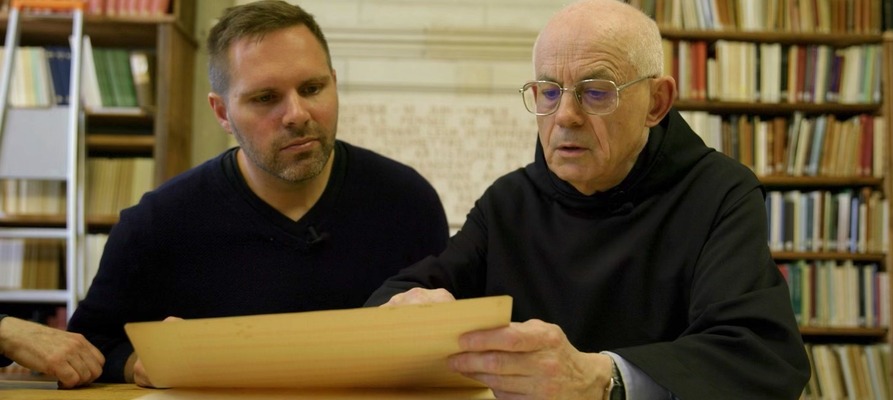
By Peter Finney Jr.
Clarion HeraldGreg Boudreaux of Mandeville is one of the founders of The Vigil Project, a group of Catholic musicians who banded together in 2016 to spread the joy and power of devotional and liturgical music to church parishes across the country.
In the last seven years, The Vigil Project has performed and conducted music workshops and retreats at more than 300 Catholic churches, all with the dual aims of deepening faith and raising the level of Catholic musicianship.
Growing out of that vision, The Vigil Project has embarked on an ambitious undertaking – an eight-episode video series entitled “Meaning of Music,” a truly global look at the history and perhaps the future of sacred and devotional music in the Catholic Church through the eyes of Catholic musicians and composers around the world.
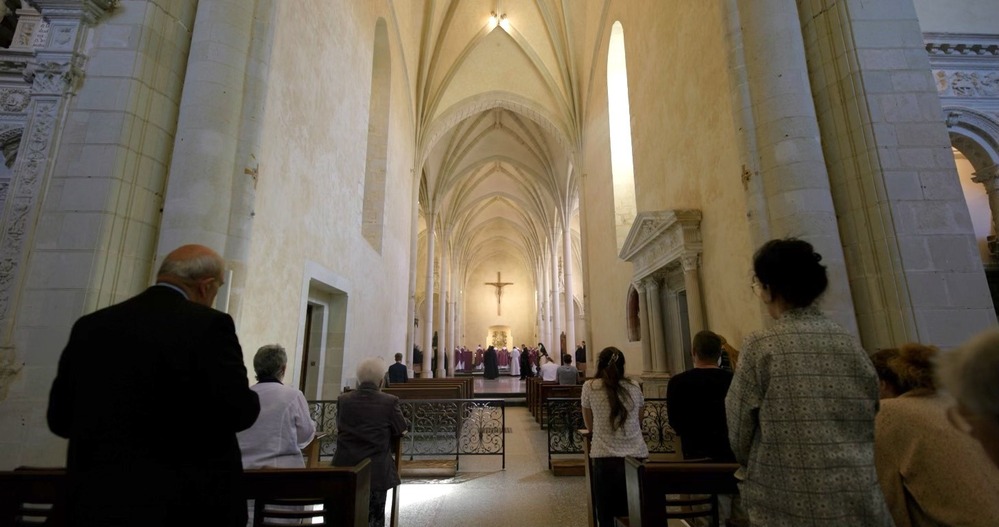
Benedictine Abbey of Solesmes, France
“Music speaks to people because it is a universal language,” said Boudreaux, whose team members traveled to Benedictine monasteries in France and Senegal, to pubs in Ireland and to Argentina, Paraguay, Italy, England, Spain, six U.S. cities, including New Orleans, and to the Louisiana State Penitentiary at Angola. “Music is, ultimately, something God has given us. It communicates something that is living, something that is dynamic. It’s not something that’s flat on a page – it’s alive.“It’s also kind of an intermediary, because we can’t see the sound waves of music, but we know it’s real. Maybe on some level, it’s a way for us to practically connect with a God who is invisible, a God we cannot see. Of course, we can see the Eucharist, but we can’t see the movements of God. As an analogy, maybe music gives us a way to see, hear or experience movement that is invisible but is real.”
The idea for the video series grew out of feedback The Vigil Project began receiving at the parish workshops the music group conducted.
“We started to recognize similar patterns – kind of a divisiveness – which wasn’t just in music ministry,” Boudreaux said, referring to different styles of music played at different Masses, from contemporary groups to the Latin Mass “and everything in between.”
“We as musicians mostly play a certain style of music, but we love the music of the church because God has given us all music,” Boudreaux said. “I think it raised the question, ‘Why would music, in all of its forms, be something that’s divisive when, obviously, God intended it to be something that unites us as a parish?’”
Boudreaux said another question came up often in the group’s travels: “Why is the music in the Catholic Church, generally speaking – and this is both inside the liturgy and outside the liturgy – kind of not excellent?”
The desire to remedy the divisiveness over musical styles that exists within the church and to enhance the sometimes subpar quality of church music “is where our passion and motivation come from,” Boudreaux said.
“Our music is focused mostly on devotional music – we’re not really aiming at liturgical music as a ministry – but I think our ministry has taken us to the point where we need to look at this whole picture as a church to receive again the gift of music,” Boudreaux said.
The eight, 30-minute episodes feature interviews with experts in different forms of music, both inside and outside the church. Episode 1 – “Genesis of Music” – explores where music comes from on the natural level and how its notes affect humans on an emotional level.Other episodes will delve into culture and community, how music expresses emotions beyond the spoken word, the heritage of song, how ancient sacred music resonates with modern composers, the gift of contemplation and silence, cultural representations of church music and music as a beautiful gift from God.
Boudreaux said it was important for the series to cover the “geographic” spectrum of church music – “from Vatican City to the mission outposts in Africa” – as well as the “social” spectrum – “which, in our mind, is from the door of the church to the door of the bar and every door in between.”
“We’re not just Catholic when we go to Mass on Sunday; we’re Catholic throughout our lives,” he said. “Our goal was to see as much as we could of that entire picture because that gives us a universal picture.”
Among Boudreaux’s favorite road trips were to two Benedictine monasteries – in Solesmes, France, and Dakar, Senegal – foremost experts in Gregorian chant.
“The Benedictine monks of Solesmes have been entrusted with Gregorian chant – preserving it, studying it, understanding it, passing it on,” Boudreaux said. “That’s what they do.”
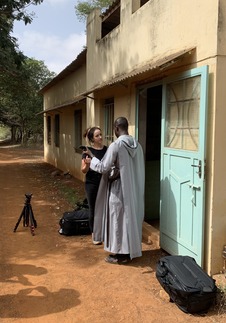 The monks in Solesmes responded to a request from a bishop in Senegal to establish a Benedictine monastery in Senegal – Keur Moussa – that also would have an interest in using Gregorian chant to sing the Liturgy of the Hours throughout the day.
The monks in Solesmes responded to a request from a bishop in Senegal to establish a Benedictine monastery in Senegal – Keur Moussa – that also would have an interest in using Gregorian chant to sing the Liturgy of the Hours throughout the day. The African Benedictines use a stringed instrument called the “chora” – which looks like a harp placed over a large gourd – to accompany the chanting.
“The monks were telling us that Senegal is a Muslim country, which has Christian missionaries,” Boudreaux said. “But the Muslims were telling the Christians, ‘We don’t think you pray; we don’t see you pray; we don’t hear you pray because you don’t stop throughout the day and pray.’ The monks were saying that many Muslims come to their Liturgy of the Hours throughout the day to pray. They don’t want to be Catholic, but they say to the monks, ‘God is here when you sing and when this music is happening.’”
In Pittsburgh, Father Chris Donley told Boudreaux that he had to interview one of his parishioners who would come to daily Mass whenever he was in town, although he traveled a lot. Boudreaux had no idea who the man was.
“It turns out we interviewed Manfred Honeck, who is a world-renowned, Grammy-winning maestro of orchestras,” Boudreaux said. “He travels the world and conducts the biggest orchestras in the world. To sit down with him and glean his perspective on music was an example of ‘we didn’t have him on the board of potential interview subjects!’”
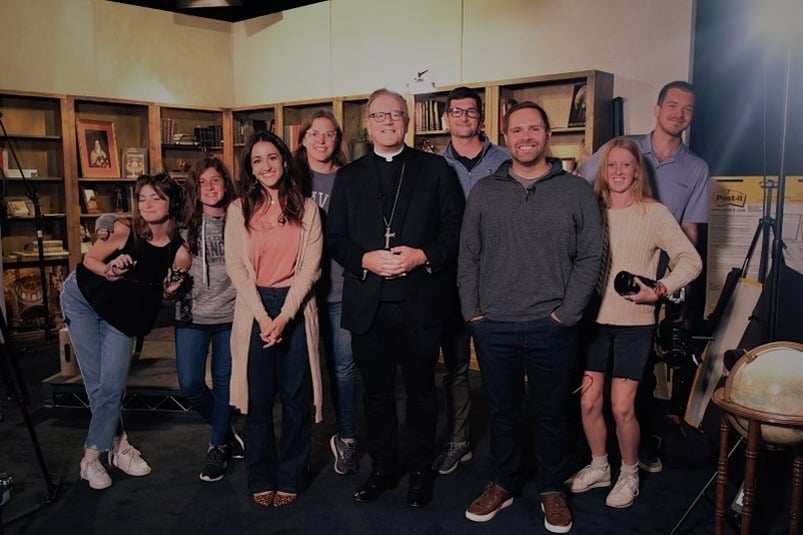
Bishop Robert Barron
Among others, Boudreaux interviewed Bishop Robert Barron, creator of the “Catholicism” series for PBS; nine-time Grammy winner Matt Maher; the late Bishop Fernand Cheri; former Tulane University pianist and composer Ben Batalla; contemporary Christian music composer Stephen Curtis Chapman; the Dominican Sisters of St. Cecilia in Nashville; pianist Eric Genuis, who has performed at Angola; and Italian Father Marco Frisina.The Vigil Project is preparing two print resources to complement the video series: an eight-week, parish-study program and a curriculum designed specifically for musicians.
“Our mission is really to raise up music,” he said.
The official rollout of the video series will come in the fall, but Episode 1 of “Meaning of Music” may be seen in a free premiere and Q&A panel with the cast April 26 at 7 p.m. at Schulte Auditorium of Notre Dame Seminary, 2901 S. Carrollton Ave., New Orleans. Doors open at 6:15 p.m. Advanced registration is required at www.thevigilproject.com/screening.
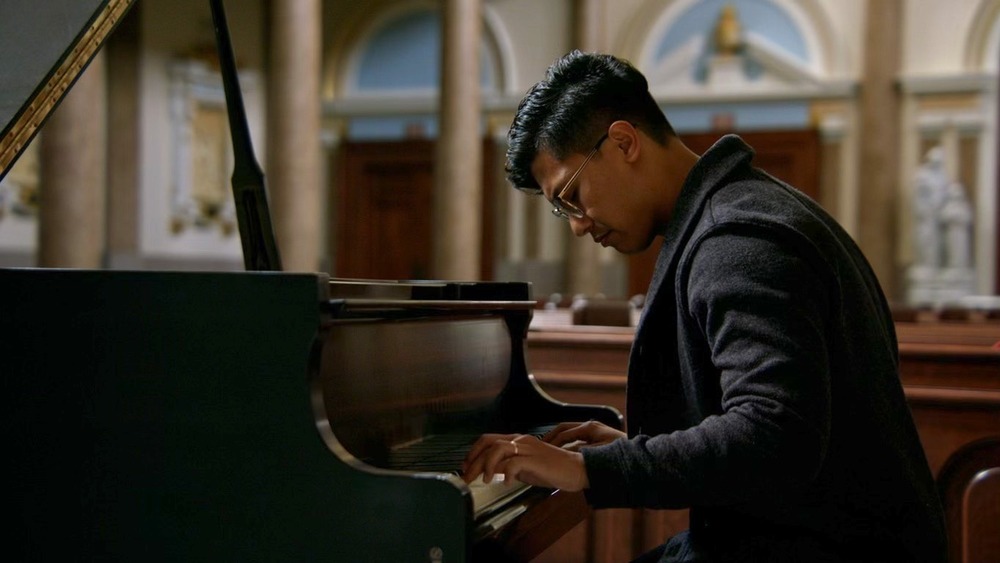
Ben Batalla will perform on the piano.




